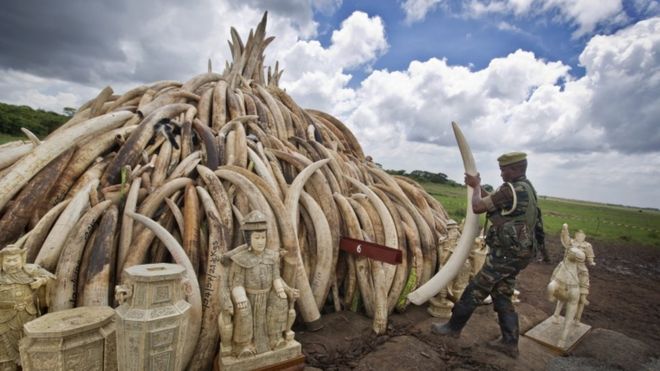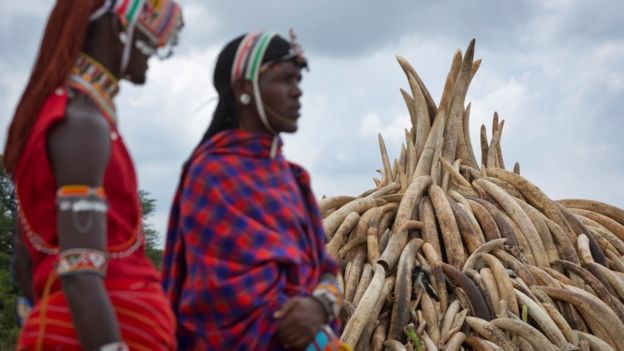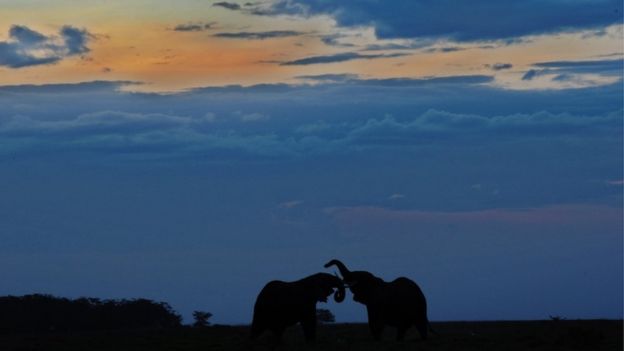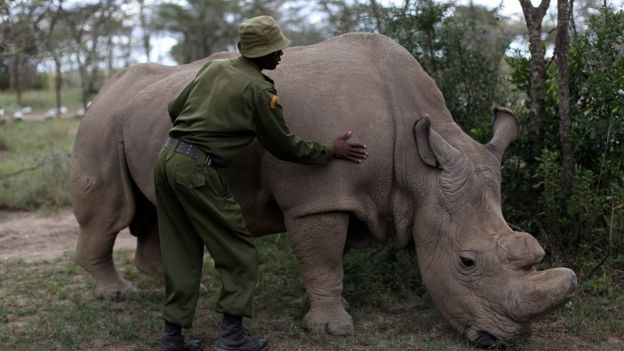Giants Club elephant summit: Kenya calls for end to ivory trade
 AP
APPresident Uhuru Kenyatta of Kenya has urged an end to Africa's illegal ivory trade, saying it means death for elephants and death for tourism.
He is hosting a summit of African leaders, business people and scientists in Nanyuki, central Kenya, to discuss how to save elephants from extinction.
Experts warn Africa's elephants could be extinct within decades.
After the Giants Club summit ends on Saturday, Mr Kenyatta will help set fire to more than 100 tonnes of ivory.
That is nearly the entire stock of ivory confiscated by Kenya, amounting to the tusks of more than 6,700 elephants.
"It will be a pleasure to burn it and do my part to destroy any possibility that poachers and their accomplices might benefit from the slaughter of Kenya's elephants," he said in a statement published on Kenya's Daily Nation.
Among those expected to attend the summit are Ugandan President Yoweri Museveni and President Ali Bongo from the west African nation of Gabon.
War on elephants, by Alastair Leithead, BBC News
 Reuters
ReutersThe ivory is getting through because people are prepared to pay for it. Stopping the men with arrows and the corrupt officials is just one part of the solution - the other is destroying the hunger for ivory.
The love of ivory goes back millennia. Its pure, translucent beauty and the ease with which a tusk can be carved into intricate sculptures have given it a lasting value throughout the ages.
Tackling demand and destroying the market are both important but there are also ways of making elephants more valuable alive than dead.
In the parks and game reserves of Africa, close encounters with the most remarkable animals on the planet lie in wait - you just need time, patience and a good eye.
Rapid decline
Mr Kenyatta said elephant herds across Africa were being besieged by a new generation of poachers - well-armed and connected to international markets - and the results had been catastrophic.
 AP
AP"Ivory means death; death for our elephants, our God-given heritage, and our tourism sector," he wrote.
"Ivory also means illicit funding of terrorist activities in parts of the African continent. We all have to do everything within our power to stop poaching and trade in ivory."
The patron of the summit, UK-based newspaper proprietor Evgeny Lebedev, told BBC News it was aimed at raising funds for conservation and coming up with strategies to tackle conflicts between the animals and people.
"Very possibly by 2025, these magnificent creatures will be completely extinct," he said.
Elephants, he warned, faced the prospect of vanishing from the wild like white rhinos.
Researchers say Africa has only a 10th of the population of elephants it had nearly a century ago.
It is home to between 450,000 to 500,000 elephants but more than 30,000 are killed every year for their tusks. Tanzania lost 65% of its elephant population in the last five years.
Pyres of ivory
The Kenyan ivory has been piled into a dozen giant pyres.
It will be seven times the size of any stockpile destruction so far, and represents about 5% of global ivory stores.
Some 1.35 tonnes of rhino horn will also be burned.
The street value of the ivory to be destroyed is estimated at more than $100m (£70m), and rhino horn at $80m.
Appetite for ivory in Asia is fuelling demand, with the main trafficking route running through the Kenyan port of Mombasa.
"We don't believe there is any intrinsic value in ivory, and therefore we're going to burn all our stockpiles and demonstrate to the world that ivory is only valuable on elephants," said Kitili Mbathi, director general of the Kenya Wildlife Service.
Mike Pflantz, from the campaign group Space for Giants, told BBC News: "What we've got here is the politicians, the presidents, the leaders of the countries who host more than half of Africa's remaining elephants."
He called for "better rangers on the ground, better prosecutions in the courtroom and making sure that we try to stop elephants and humans interacting in a way that causes elephant deaths".
 AFP
AFP Reuters
ReutersDo you own any ivory products? Would you consider selling or burning them? Email haveyoursay@bbc.co.uk with your views.
Please include a contact number if you are willing to speak to a BBC journalist. You can also contact us in the following ways:
- WhatsApp: +44 7525 900971
- Send pictures/video to yourpics@bbc.co.uk
- Tweet: @BBC_HaveYourSay
- Send an SMS or MMS to 61124 or +44 7624 800 100
No comments:
Post a Comment